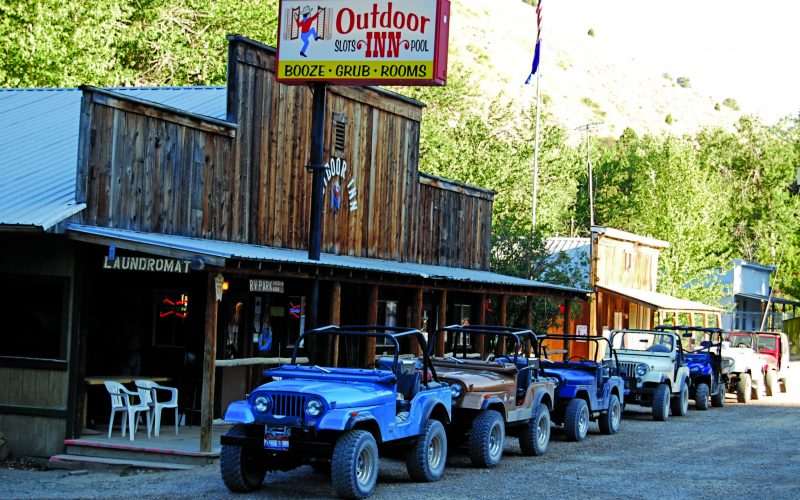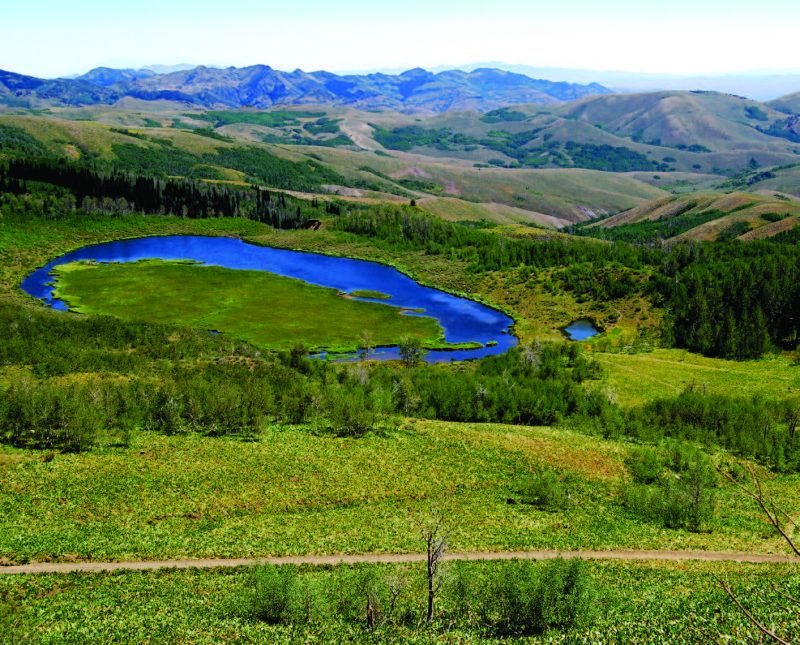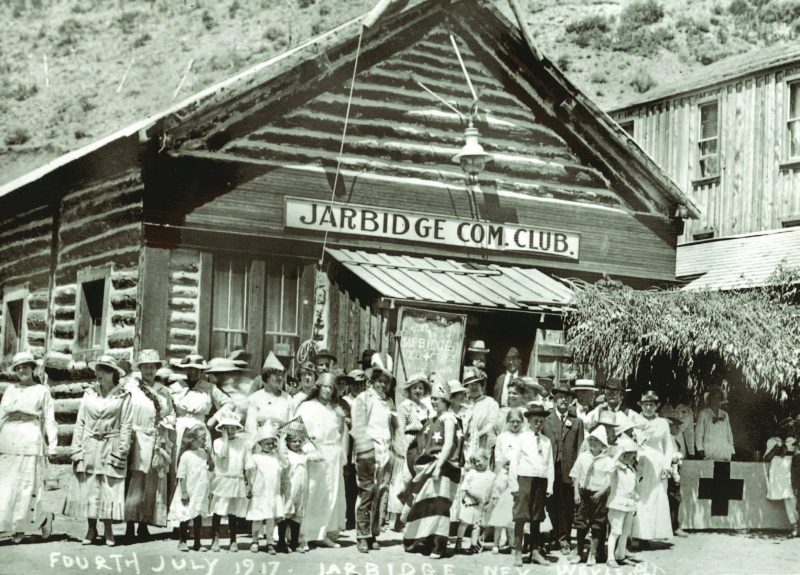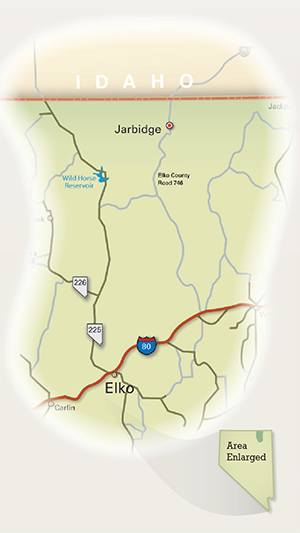Journey To Jarbidge
March – April 2014
JOURNEY TO JARBIDGE
One of Nevada’s more unique mining camps holds a past as colorful as the scenery that surrounds it.
BY ERIC CACHINERO | MARCH/APRIL 2014
 Many Nevada towns owe their origins to a prospector, a pickaxe, and the discovery of gold. Though these elements are certainly entwined in its roots, the story of Jarbidge begins a bit more eccentrically; it begins with a legend. Shoshone Indian lore told of a man-eating giant that frequented the area that would become Jarbidge Canyon, ensuring a grisly demise to anyone who dared to brave the region. However, nothing—including the viciousness of a mythical cannibal—could deter the prospectors whose only compass was the allure of glittering gold.
Many Nevada towns owe their origins to a prospector, a pickaxe, and the discovery of gold. Though these elements are certainly entwined in its roots, the story of Jarbidge begins a bit more eccentrically; it begins with a legend. Shoshone Indian lore told of a man-eating giant that frequented the area that would become Jarbidge Canyon, ensuring a grisly demise to anyone who dared to brave the region. However, nothing—including the viciousness of a mythical cannibal—could deter the prospectors whose only compass was the allure of glittering gold.
THE LEGEND OF TSAWHAWBITTS
According to Shoshone legend, a giant cannibal named Tsawhawbitts (pronounced “tuh-saw-haw-bits”) roamed the canyon looking for unsuspecting souls to devour. Shoshones avoided the region for fear of the evil giant, who they believed would capture men, toss them in a large basket, and take them back to his camp before consuming them. The area was uninhabited by the Shoshone for many years, before the quest for gold led to activity in the region.
Because of its remoteness, Jarbidge Canyon originally saw minimal traffic by prospectors. Folklore tells of several substantial finds in the area that ended up lost forever, including a discovery of rich ore circa 1883. A sheepherder by the name of George Ishman is said to have discovered ore in the area that assayed for $1,200 per ton, but he was stricken by illness before he could relay the location of the riches.
Prospectors’ efforts almost proved futile until 1909, when a man by the name of Dave Bourne discovered gold in the canyon and didn’t keep quiet about his finds.
THE TONGUE-TWISTER TOWN
 Bourne quickly spilled the beans, claiming that more than $27 million worth of gold was visible in what would come to be known as Jarbidge Canyon. Drawing major interest from newspapers across the country, the discovery triggered a gold rush, causing hopeful prospectors to swarm to the region.
Bourne quickly spilled the beans, claiming that more than $27 million worth of gold was visible in what would come to be known as Jarbidge Canyon. Drawing major interest from newspapers across the country, the discovery triggered a gold rush, causing hopeful prospectors to swarm to the region.
The rush for riches led to the formation of the Jarbidge Mining District, and by 1911, the town had a population of approximately 1,500 and boasted a new school, improved roads, a variety of businesses, and a community hall, which still stands. The young town’s future looked hopeful, and there was even talk of forming a new county once Jarbidge’s population became large enough.
Though at the time of its discovery the settlement should have been called Tsawhawbitts, mispronunciation resulted in an unusual moniker. Settlers began to incorrectly refer to the town as Jahabich (pronounced “jah-hah-bich”). The muddled name continued to evolve until a sign, which read “Jarbidge,” was hung in the town.
According to Penny Eggen, director of tourism and public relations with the Jarbidge Community Association, the Elkoro Mining Company came to Jarbidge in 1913 and bought numerous claims. The mining company is believed to have removed approximately $10 million in gold by the time the company closed in the 1930s. “The mine was, at one time, the largest-producing gold mine in Nevada,” Eggen says.
Like many mining camps in Nevada, Jarbidge had its share of law intervention. The town was the location of the last stage robbery in the United States. That is stage, not stagecoach. According to a vignette published by the director emeritus of the Northeastern Nevada Museum in Elko, Howard Hickson, “stages were wagons that carried the mail and small shipments including bank deposits and other financial transactions.”
In 1916, a man by the name of Fred Searcy was driving a horse-drawn stage into Jarbidge when he was attacked and killed. The culprit, a man by the name of Ben Kuhl, and his accomplice, Ed Beck, fled with several thousand dollars, but were apprehended and quickly tried. In the process of the murder and robbery, Kuhl apparently left a bloody handprint on a piece of mail, which, according to an article published on the official website for the community of Jarbidge, was “the first time a palm or fingerprint had ever been admitted as evidence in a court trial in the world.”
As mining in Jarbidge continued over the years, the town continued to build and expand. Then came the fire.
DWINDLING RICHES & THE WHISKEY CALAMITY
 According to Hickson, the Elkoro Mining Company installed power lines in Jarbidge in 1919, but refused access to town residents; a decision that would come to haunt the company.
According to Hickson, the Elkoro Mining Company installed power lines in Jarbidge in 1919, but refused access to town residents; a decision that would come to haunt the company.
“A barrel of homemade whiskey blew up in the basement of the Success Bar,” Hickson writes on his website, gbcnv.edu. “With the help of open gas lamps and an explosion, the fire quickly spread. Burning tar paper floating in the wind spread the fire to the other side of the street.”
In all, more than 20 business establishments and log cabins succumbed to the inferno, including a telephone office, movie house, and dance hall. According to Hickson, residents of Jarbidge were bitter. They claimed that gas lamps wouldn’t have fueled the fire had Elkoro allowed residents to hook into their power lines. Eventually the company conceded and allowed people to connect to its lines.
Jarbidge reached its pinnacle as a productive mining camp between 1916 and 1933, before all major mining operations were suspended in 1941. Though several small mining operations continue today, the millions of dollars in gold that Bourne once reported have since been removed.
MODERN DAY MINING CAMP
Laying legitimate claim to the title of most isolated town in the lower 48 states, Jarbidge sits neatly tucked amongst rivers and tall peaks, surrounded by miles of spectacular scenery. Located more than 100 miles north of Elko, the area is renowned for bubbling brooks full of trout; flourishing populations of Rocky Mountain elk, mule deer, and other wildlife; and miles upon miles of remote dirt roads which weave throughout the Jarbidge Wilderness.
In the summer months, the quaint town attracts the eye of both trekkers and tourists. Cozy bed-and-breakfasts, an RV park, and several primitive campgrounds make Jarbidge an attractive location to experience the atmosphere of a historical Nevada town.
Fishermen are drawn to the area because of the surrounding rivers and alpine lakes, which hold an abundance of mountain whitefish and redband trout. The town becomes a popular big game hunting camp during the late-summer and fall months when hunters from across the state flock to try their luck in the vast wilderness area.
The town is home to a couple dozen year-round residents, drawing larger crowds during its various annual celebrations, including the Labor Day Corn Feed, Fourth of July parade, and its largest celebration of the year, Jarbidge Days. The annual festival is comprised of a craft fair, parade, community yard sale, live music, and more.
Jarbidge offers an assortment of amenities and services, including the Trading Post, which sells groceries, souvenirs, and supplies; and the North Star Mine Gas and Gifts, which sells gas year-round. The town site also includes a look at old miners’ cabins, the old Jarbidge Jail, and former brothels. The Jarbidge Community Hall is still used for meetings, dances, church services, weddings, and more. The original stage curtain in the hall depicts a Venetian gondolier and ads for early businesses, all of which are no longer there.
According to Eggen, a common misconception, though, is that the town becomes completely inaccessible during the winter months. “I’ve lived here for 10 years and have always been able to get in and out,” Eggen says. “It really is a 12-month year here.”
So if you find yourself with a yearning to explore one of Nevada’s isolated treasures, the town of Jarbidge awaits. Just keep an eye out for ol’ Tsawhawbitts.
Click here to subscribe to Nevada Magazine.
PLAN YOUR TRIP
 Outdoor Inn
Outdoor Inn
P.O. Box 260093, Jarbidge, NV 89826
nevadadventures.com, 775-448-2311
Tsawhabitts Bed & Breakfast
5 Main St., Jarbidge, NV 89826
775-488-2338
Visit jarbidge.com for more information.
2014 JARBIDGE EVENTS
• Memorial Day celebration, May 24-26
• Fourth of July celebration
• Jarbidge Days, Aug. 8-10
• Labor Day Corn Feed, Aug. 30-Sept. 1
• Halloween Pig Feed
THE ELKO ENTERPRISE
DETAILED REVIEW OF THE JARBIDGE STAGE ROBBERY
The last stage robbery in the United States occurred nearly a century ago outside the northeastern Nevada mining town of Jarbidge. Following is an excerpt from the December 14, 1916 edition of The Elko Enterprise.
BY W. W. FISK
For the past two days our little town has been in a sizzle of great excitement and nervous tension, caused by the extreme cold-bloodedness of the murder that accompanied the hold-up of the mail stage on last Tuesday evening, December 6, [1916]. Not for many years has anything so atrocious been recorded in the criminal annals of the hold-ups through the country.
To deliberately crawl up behind an innocent young man, driving an open wagon in a snowstorm blizzard, and who was probably nearly stiff and numb with the cold, and then without warning or any chance for the helpless bundled-up driver to protect himself or to surrender in order to save his life, to place a big gun against the back of the defenseless head and snuff out a human, and then coolly drive the team through the lower part of town and off into a thicket of willows in the river bottom and leave the team and corpse to be buried in the falling snow; it was surely enough to influence the last spark of manhood in the men and to cause the women to keep very close to the house. Short shrift would have been made of him had the inhumane culprit been found that night. The ground was gone over with flashlights, but the new fall of snow made it very hard to follow any trail. Guards were out on the roads and trails going out of town, and they have been well guarded ever since and no man allowed to leave the camp.
The body of the driver, F. M. Searcy, was left on the seat where he usually sat to drive, on the right hand side next to the brake, with the body leaning over to the left and resting partly on the seat, in which position, he had remained for about five hours, during most of which time it had been snowing and there was nearly three inches of snow on the body. The wagon was worked out of the brush and driven up to the post office. Near the wagon buried in the snow was found two of the second-class mail sacks, which had been opened and part of the papers and small packages scattered about the ground. There were tracks barely visible under the snow leading from the wagon off into the brush, but they could not be followed in the night, although some men kept at it most of the night. There was one large track that seemed to be accompanied by a dog’s track, and in places there seemed to be a smaller track.
The next morning early there were many men on the trail and hunting for evidence. It was found that the trail after wandering around through the brush and into several extra thick bunches, in one of which he evidently cut open the first-class sack and removed the registered letters and packages. There were tracks leading to the river, where he had evidently gone to wash his hands, then he went back into the brush again and afterwards went up a little further to where there is a trail leading into town across a footbridge. Later the first-class sack was found near this trail, about 100 feet from the bridge, near Meyer’s cabin, and almost across the river from the post office a dog led the searchers to his sack which was about 20 feet from the trail in the edge of the brush. Most of the bundles of letters had not been molested, but the Rogerson letters had been looked over and all those from the bank had been opened and read, and several of them had bloody fingerprints on them. The seal had been cut open and all the packages of money were missing. Crumley & Walker, who ran the Success Bar and café, had two packages of bills containing $3,000 and one package of silver containing $300. Mrs. Walker was also expecting several hundred dollars in change for the café. A few other parties who had been expecting small sums of money do not know yet whether it was in this mail or not. H. Braunhand reported to have lost $1,000, but it was later learned that this was in Cashier’s checks and therefore will not be a loss.
Monday afternoon several big freight teams left Jarbidge, and they met some freight teams on the Crippen grade and worked all that night and half the next day to get past each other. So that when the mail did not arrive on time it was at first supposed that it was held up by this block on the grade, but about 6 o’clock the loaded team got into town and about the same time the empty teams arrived at Rattlesnake station and one of the drivers telephoned in that he met the mail near the top of the grade. Then it was thought that possibly the mail stage had some trouble on the grade and the postmaster hired Frank Leonard to take a pack horse and go meet the stage and bring in the first-class mail, but he did not find anything of the stage.
About 9 o’clock, one of the freighters, Mr. Campbell, who had camped across the river in the lower town, came up town and mentioned that the stage passed his camp about 6:30. About this time Mrs. Dexter, who lives in the first house in lower town, having heard some way that the mail had not arrived at the post office, telephoned to the postmaster that she saw the stage pass her house about 6:30 and that she spoke to the driver, who was all humped up on the seat, but who did not reply, she said that it was blowing and storming so badly that she could not see clearly although the stage passed within 15 feet of her.
Then Mr. Campbell said that the stage passed within a few feet of him as he was unhitching his team and that knowing Fred, the driver, he sung out to him, “Hello kid,” as he went by, but did not receive any answer, so he said perhaps the poor lad was so nearly frozen that he had driven right on to the barn, and some of them went over to the stage barn but did not find the team there. Then a bunch of men started out to look for him, but yet having any suspicion of foul play, they went to the bridge, about 1,200 feet north from the post office and looked over the brushcoved bottom from the bridge to where the freighters were camped without finding any signs of the team. They then came back up the road and spread out across the bottom to work and had not gone but about 200 feet when then found the team with the driver on the seat and apparently dead. At first it was thought that he was stiff with the cold and the team had wandered off the road, but when they thought the matter over they came to the conclusion that the horses would not have left the road when so near their barn; then it was discovered that the first-class mail sack was missing and someone saw some blood, at which point it was forced upon them that there must have been foul play.
The postmaster, Scott Fleming, then told them not to touch anything and left part of the men there to guard the outfit while the rest went to town to get the officers and lights. Justice of the Peace J. A. Yewell, Constable J. C. Hill, Deputy Dave Marquardson, and many others went back to the place and it was found that it had been a sure enough hold-up and that the poor lad, Fred Searcy, had been shot through the head and had been dead for some time. The team was taken to the post office and the body taken care of.
Wednesday morning the signs that were in evidence told the horrible details of the inhuman affair. There are so many holes around a mining camp and every once in a while someone will shoot off a gun, that a gun shot does not attract much attention, but after it was learned that this man had been shot there were several people who recalled hearing a shot. The signs indicate that the murderer went down the road about a half a mile, just around the point beyond the residence of Mrs. Dexter and just outside of the townsite limits; that he left the road and got behind a clump of brush near the road and must have run out as the stage passed his place of hiding and climbed up off the brake team and then up on the load and about the driver from behind without saying a word, the bullet entered the head just above the left ear, and later at the autopsy it was found that it passed clear through the head and out through the mouth, knocking out two of his lower front teeth.
When the fatal shot was fired death must have been very sudden, and the assassin must have caught the body with one hand and eased it into the bottom of the wagon while with the other hand he grabbed the lines. When the shot went off it evidently startled the horses enough for them to swerve a little from the road and the wheel track went out almost four feet, which brought it very near the edge of the grade. It went along the edge for about 76 feet and all along this distance there is a solid stream of blood, which would indicate that Searcy’s head was hanging over the edge of the wagon; at this point the hold-up had obtained control of the team and directed them back into the road, while at the same time he had probably pushed the body back into the wagon under the seat and with a great show of nerve he proceeded to drive the team high along passing the house of Mrs. Dexter who was on the porch and spoke to him, on by several houses and right alongside the freight teams, where Mr. Campbell hailed him, then a few hundred feet further where he turned off the present road and took the old road which had to ford the river, and then as soon as he was well into the brush he sat the body back on the seat and leaned it over so that it would remain on the seat, turned the horses off the old road into a big clump of willows where they would be likely to stand, as they did, for five hours, and then took the sacks out from the front of the wagon and opened the second-class sacks and went through them, but apparently without finding anything that he wanted, after which he started off with the first-class sack to find a thick bunch of brush in which he could use a light to look over the mail, which he did with considerable thoroughness. Then he must have gone to his tent or cabin and changed his clothes and probably came up town and joined in the hunt for the guilty fiend.
There are only a few large dogs in camp, and Mr. McCormick, who is somewhat of a hunter, had a theory that it would be a good idea to watch these dogs and he picked out one in particular which is a sort of tramp dog. Mr. McCormick thought very likely that the dog might go back over the trail he had been down and carefully examined the dog tracks in the snow, blowing out the light new snow and obtaining a very good print in the old snow underneath and from this he thought he had the right dog spotted. About 10 o’clock this dog started for the footbridge with his nose on the ground as if he was following a trail, and Mr. McCormick and several others went after him, the reasoning seemed to be good as the dog went directly to where the first-class sack lay covered up with snow. Then they began to figure who the dog had probably been following and soon decided on a young man to whom the dog had been quite attached and one who had previously been in some trouble here over jumping a lot for which he is new under bonds on appeal from a $400 fine. This lot is next to the one which the post office sits and was bought a few weeks ago by Oscar and Ernest Hayes. There was a small cabin on it which was moved off one morning and the lot graded a little for a larger building, but owing to a lack of lumber work of building was not started the next day but a sign was put up that a building was to be built as soon as the rest of the lumber arrived, that night the lot was jumped and a tent put on it by Ben Kuhl. He was arrested for trespass and acted as his own lawyer. During the trial he was fined $50 for contempt of court for remarks that he made to the judge about it being a Kangaroo court.
Mr. Kuhl was arrested about 1 o’clock, given a short hearing at which he denied the charge and brought witnesses to try to prove that he was in town all the evening, but his witnesses were not very sure about the time and he was placed in jail. Later the searcher found a long black overcoat stashed under the bridge here in town and came up for the officers to go and see it. When they arrived there and looked around some more the sack of silver stolen from the mail sack was found, but it had been opened and $18 taken out, leaving $182. A package of registered letters was also found there.
When the coat was shown to him, he said it was not his and denied having had any coat, but later in the day his partner who is working at the Long Hike mine came down and identified the coat as one that belonged to Kuhl and said that Kuhl had given it to him some time ago but that it had remained in their cabin. There was a jack-knife in the pocket of coat, but Mr. Kirby could not say for sure whether it was one that belonged to Kuhl, although he thought it looked very much like one that Kuhl had.
A search of Kuhl’s cabin did not reveal much. Later a shirt was found in the river with a stone tied in the sleeve to sink it; there was no blood on the shirt, but then the cold water would have washed out any blood. The shirt was similar in make and material to one that Kuhl was wearing, and some of the laundry marks were similar. There was a gun in his house that had one cartridge that had been snapped and did not explode while the next cartridge was empty. Kuhl said this gun did not belong to him.
Today it was learned that the gun mentioned above belonged to a gambler, but he said that he had not had it for over a month. The last party known to have borrowed this gun is a small man known as Billy McGraw, and he has a partner named Jennings who is a large man and the officers—after thinking this evidence over and the fact that there appeared to be two tracks near the wagon, a large and a small—got out warrants and arrested McGraw and Jennings. A great many are quietly working and looking around for evidence, and it is very likely that other arrests may be made as a safeguard until the whole ground shall have been thoroughly examined by more experienced men from the outside. Probably some of Uncle Sam’s best will be here unless the right man is found and he confesses. But who would want to confess to such an uncalled-for and cowardly crime? And yet the very awfulness of it might cause him to break down and make a full confession.
As yet it is impossible to say whether there was one or two concerned in it, but it is possible that several were knowing to it, or it may be that the guilty one is trying to throw the evidence on to an innocent party. It may take considerable work to prove who was the active party, but it is pretty sure that he is still in the camp and there is very little chance for him to get away.
Meanwhile the body of Fred Searcy lays here a mute appeal for action. As soon as possible the body is to be shipped to his family. Mr. Searcy was in his prime; about 22 years of age, he had been driving the parcel post wagon for some time, but about two weeks ago he took the first-class mail stage. He was a steady worker and had many friends. Before coming here he worked for a while in Twin Falls for a Mr. Waters. He had no family, although he had at one time been married. His mother and sister lived in Washington, but his sister now lives in Independence, Missouri, where his body will be sent. His sister expects to come out to accompany the body home.
The whole camp trembles with indignation for the cowardly act and sorrow for the unfortunate victim.

